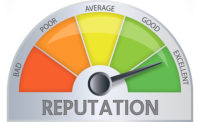Trust is the foundational basis of all relationships long and deep. Is there anyone in this world whom you really trust? I imagine the list is short. Who could possibly make the cut? I guess it could be your spouse, one or both of your parents, a child, a longtime close friend, a minister, your dog.
These are some people (and maybe a creature) with whom you may have established a trusting relationship. Of course, there are different levels of trust. Trusting someone to speak words of encouragement or bail you out when you find yourself in a crisis or facing dire circumstances is completely different from asking someone if there’s catsup on your chin. You feel completely at ease asking a perfect stranger on a busy city street what time it is and proceeding forth with your schedule trusting the answer they give is accurate. But, you might think twice about asking that same person to keep an eye on your double-parked car with it running while you run into the dry cleaner to drop off your laundry.
It takes a long time to establish trust with people; heck, sometimes you don’t even trust yourself. It usually takes years of repeated positive experiences to prove another person trustworthy. If it takes all this enormous time and effort to enable us to get to a place where we feel comfortable trusting someone, how can we expect our customers to trust our field representatives the moment they walk through their doors? Why should they?
LAY A TRAIL OF TRUST
Our customers call us when they’re experiencing a problem. In the case of an air conditioning breakdown, they perceive their problem to be teetering on life-threatening. In what they may think is their most vulnerable moment, we expect them to swing that door wide open, welcome a stranger into their homes, and lay complete trust at his or her feet. Exactly what have we done to earn such trust? If you’ve never contemplated this dilemma, I imagine you’ve done nothing and are reaping the consequences. Hopefully, you’ve not only given it a lot of thought, but have implemented practices that lay a trail of trust that leads right to your customer’s door.
There are plenty of things you can do to establish trust with a customer. Repeat customers are easy. If you’ve been servicing a client for years, you hopefully have a well-earned barrel of trust just waiting to be poured out. It’s the new people who are at risk here. Think of it this way: Every interaction with a customer is an opportunity to build up or tear down trust. It starts with how they find your phone number to begin with. Are you listed in places they expect and trust? Can they easily find you on the Internet, hear your number on the radio, or see you on the television? If they ask a neighbor or look at reviews, are you viewed as trustworthy? When they call you, is the phone answered by someone who is pleasant and knows what they are talking about? Is their problem taken care of right away and efficiently? Is the information they’re seeking relevant and handled professionally? This is make-it-or-break-it time. If the call for service doesn’t give them a reason to think their problem is going to be addressed properly and in a reasonable amount of time, their only choice is to think it’s not being handled correctly. It’s a pivotal moment.
KEEP YOUR PROMISES
Arriving in the timeframe that was promised is a watershed moment. Here’s the first promise you’ve made, and now we’re going to find out if you can keep a promise. If you tell someone you’ll arrive between 10 a.m. and 1 p.m., you’d better be there in that window. To do otherwise could be viewed as lying.
Showing up at or outside of the appointed time is a key indicator of how the rest of the call will go. It’s the first chance you have to show you’ll do what you said. Where you park, how long it takes you to get out of the truck, whether you’re wearing sunglasses that hide your eyes, whether you’re wearing an official uniform, whether you show up with the tools and supplies you need — these are some of the unasked questions that need to be answered in the first few moments of your arrival.
I call them unasked questions because that is exactly what they are. While people often ask lots of questions, everyone has many questions rolling around in their heads that are never actually verbalized. But, that doesn’t mean they don’t need to be answered — they all need to be answered.
Your job is to anticipate all the questions a customer may have and make sure they’re all answered before the doorbell is rung. If you fail to answer all these questions correctly, you’re simply setting yourself up for failure. When it comes time to sit down with an unsuspecting customer and rock their world with a large repair bill or worse, don’t you think it would be to everyone’s advantage if there was an Olympic-size pool of trust ready to dive into?
Publication date: 9/7/2015
Want more HVAC industry news and information? Join The NEWS on Facebook, Twitter, and LinkedIn today!








